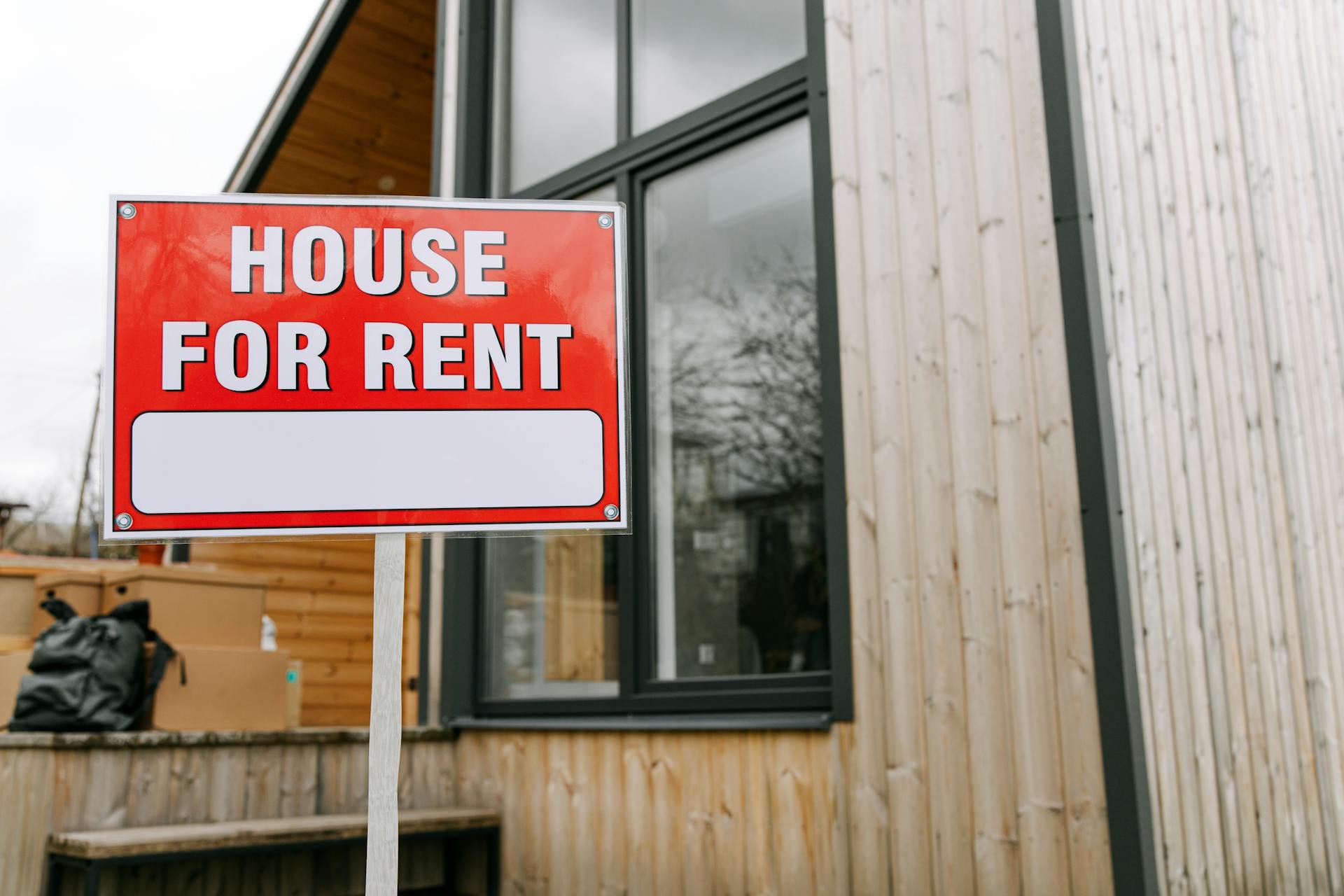
Landlords can ask for bank statements as part of the rental application process, typically to verify income and employment. This can be a common practice in many countries, including the UK and Australia.
In the UK, for example, a landlord may request a bank statement to confirm a tenant's income and employment status. This is because the UK's Right to Rent scheme requires landlords to check a tenant's immigration status and right to rent a property.
Landlords may request bank statements to ensure a tenant has a stable income and can afford the rent.
A different take: Bank and Income Statements Quick Check
Landlord's Right to Request Information
Landlords can request bank statements as part of the tenant screening process to assess a potential tenant's financial stability and ability to pay rent on time.
In the UK, requesting bank statements during the tenant screening process is not prohibited by law, and it's a standard industry practice for landlords to gauge a tenant's ability to pay the rent.
A landlord may ask for 3 to 6 months of bank statements to verify a tenant's financial stability and assess whether their income can cover the rent and other expenses.
Landlords need bank statements to ensure you can pay the rent and have a steady source of income, especially for expensive properties or in cities where rent might be costly.
Tenants can request clarification on why a bank statement is needed and whether it's required by law, and they also have the right to refuse to provide their banking details, but this might put them in a tricky situation.
Here are some key advantages landlords can gain by requesting bank statements:
- Verifying a tenant's financial stability
- Assessing whether their income can cover the rent and other expenses
- Reducing the risk of non-payment
- Ensuring a steady source of income
It's essential to note that landlords must get permission from the tenant before collecting bank statements and ensure the data is only used to evaluate the tenant's financial stability.
Tenant Screening and Documentation
Tenant screening is a crucial step in the rental process, and financial documentation plays a significant role in it. Landlords use financial data to assess a tenant's ability to afford rent and meet their obligations on time.
Financial documents such as bank statements and pay stubs give a snapshot into a tenant's stable income sources and ability to meet monthly rent payments without fail. Property managers examine these documents to determine whether potential tenants have the financial stability to be reliable renters.
A landlord can ask for bank statements as part of their due diligence process to ensure the tenant can pay the rent and has a steady source of income. This is especially common for expensive properties or in cities where rent might be costly.
The minimum information typically asked includes account balance, contact info, driver's license number, employment data, and social security number. These details let property managers see if a tenant is financially responsible and can afford the rent.
Landlords may also request bank statements to set up automatic payments online, which simplifies the rental experience and helps tenants avoid late fees and potential check theft. They can also use bank statements to prove a tenant's income, expenses, and rent-worthiness.
Here are some key pieces of financial information that landlords can request:
- Bank statements
- Pay stubs
- Tax returns
- Social security number
- Driver's license number
In the UK, requesting bank statements during the tenant screening process is not prohibited by law, and it is a standard industry practice to gauge a tenant's ability to pay the rent.
Tenant Privacy and Security
Tenant Privacy and Security is a top concern when it comes to sharing financial information with landlords. Landlords need to be vigilant in protecting sensitive details such as bank account numbers, social security numbers, or driver's license numbers.
To safeguard your privacy, use secure online systems when sharing banking information with your landlord. This is a safe practice that ensures your sensitive financial info remains protected.
Landlords have a duty to keep your data secure, and they are guided by federal laws such as the Federal Credit Reporting Act, which regulates how they handle sensitive information like social security numbers or driver's license numbers.
Here are some tips to help you protect your tenant privacy and security:
- Password-encrypting documents containing sensitive financial info is a must.
- Request clarification on why a landlord needs a bank statement and whether it's required by law.
Tenant Privacy and Security
Landlords have a duty to keep sensitive information secure, including bank account numbers and social security numbers. This is protected under various federal laws.
Tenants can use secure online systems when sharing banking information with their landlord. This is a safe practice that helps protect sensitive financial information.

Password-encrypting documents containing sensitive financial info is another safe practice that tenants can follow. This helps prevent unauthorized access to their information.
Landlords need to be vigilant in protecting tenant details from potential threats. This includes protecting bank account numbers, social security numbers, and driver's license numbers.
Here are some safe practices for tenants to protect their financial information:
- Password-encrypting documents containing sensitive financial info
- Using secure online systems when sharing banking information
- Requesting clarification on why sensitive information is needed
- Requesting permission from the landlord before sharing sensitive information
Landlords can ask for bank statements as part of their due diligence process, but tenants can still safeguard their privacy. Tenants can request clarification on why this document is needed and whether it is required by law.
Tenant Refusal of Statement Request
If a tenant refuses to provide their bank statements, a landlord can still close their potential tenancy application. This is because a tenant is within their rights to decline to provide financial documents.
However, this refusal can influence the landlord's decision regarding the person's application. A landlord is allowed to close the application, but they must first get the tenant's permission to use their financial information.
A different take: Can a Landlord Check Your Bank Account Balance
A landlord is entitled to ask for bank statements, but the tenant must consent to provide them first. If a tenant refuses to provide the relevant documentation, the landlord can use other means to establish their financial stability.
Here are some key points to consider:
- A tenant can request clarification on why a bank statement is needed and whether it is required by law.
- A landlord must get the tenant's permission before collecting their bank statements.
- A landlord can ask for 3 to 6 months of bank statements to verify the tenant's financial stability.
The law supports a landlord's request for financial evidence, but it must be exercised within the bounds of fairness and privacy considerations. A landlord must handle any personal financial information with discretion and security to protect the tenant's privacy and data.
A unique perspective: Can I Sue My Landlord for Termites?
Why Landlords Ask for Tenant Statements
Landlords ask for bank statements to understand a tenant's financial stability, which is a cornerstone of successful property management. This helps them make informed decisions about who to rent to.
Financial data gives insights into an applicant's ability to afford rent and meet their obligations on time. It's not just about knowing if they pay rent but also gauging their overall fiscal health.
A look at your bank statements helps property managers determine whether you have enough monthly income not just to afford rent but also other living expenses comfortably. This includes account balance, contact info, driver’s license number, employment data including pay stubs, tax returns, and social security number.
Thorough tenant screening involves examining financial documents submitted with rental applications, such as bank statements and pay stubs. These details give a snapshot into whether potential tenants have stable income sources and if they'll be able to meet monthly rent payments without fail.
Bank statements can be instrumental in helping landlords make informed decisions, and they're usually protected under various federal laws. Landlords have a duty to keep this data secure.
See what others are reading: Can Bank Statements Be Used as Proof of Income
Alternatives and Mitigation
If you're uncomfortable providing access to your financial accounts, ask your landlord about alternative proof.
You can request copies of your bank statement or tax records as an alternative.
Prospective landlords have the right to ask for financial data, but you don't have to provide it without further investigation.
You can reevaluate your position or move onto the next application if your landlord refuses to accept alternative proof.
Consider reading: Can a Bank Ask Where You Got Money?
Legal Aspects and Protection
Landlords need to balance their need for financial information with the need to protect their tenants' sensitive data. This is regulated by laws such as the Federal Credit Reporting Act.
Requesting bank statements is a step towards legal and financial protection for the landlord, and may be part of due diligence in the tenant selection process required by an insurance policy.
The financial information landlords can request is governed by laws and regulations, which aim to prevent bias and ensure fairness in the process. This includes understanding a potential tenant's financial responsibility.
Requesting bank statements is not prohibited by UK law, meaning that a landlord is permitted to ask for a recent bank statement as part of the tenant screening process. These financial checks are standard industry practices to gauge a tenant's ability to pay the rent.
A tenant's financial instability could lead to missed rent payments, legal disputes, and potential property repossession, all of which impact the landlord's investment and peace of mind.
Here's an interesting read: Does Thailand Need Bank Statements to Enter
Proof of Income and Stability
Landlords often request bank statements to verify a tenant's income and stability, and it's not just about showing a steady paycheck. The Fair Housing Act requires at least three months' worth of bank statements with the rental application.
Your bank statements are crucial evidence of income flow and financial stability, providing a detailed picture of your financial health. This includes income sources, spending habits, and existing financial commitments.
Bank statements typically include two years of tax returns, both personal and corporate, which showcase revenue trends. This helps landlords assess your financial stability and ability to afford the rent.
Inspecting a profit-and-loss statement for both the prior fiscal year and the present year up to now offers an in-depth view of how your business is doing financially. This information is just as important as your personal income for landlords to consider.
Understanding Tenant Requests
As a landlord, it's essential to understand the types of requests tenants can make, such as requesting a rent reduction due to market fluctuations.
Tenants can also ask for repairs or maintenance, and landlords are required to respond in a reasonable timeframe.
Landlords are not obligated to grant rent reductions, but they must consider the tenant's request and provide a written explanation for their decision.
In some cases, tenants may request a change in lease terms, such as a longer or shorter lease period.
Landlords can negotiate with tenants to reach a mutually agreeable solution.
Tenants can also request a rent increase, but landlords must provide written notice and follow local regulations.
A landlord's refusal to grant a rent increase can lead to disputes and potential eviction.
Discover more: Can a Lawyer Request Bank Statements
Frequently Asked Questions
What can I black out on my bank statement for an apartment?
Black out your account and routing numbers on your bank statement to protect your sensitive financial information
What bank statements are needed for a rental application?
For a rental application, we typically require bank statements from the past 3-6 months to verify income and payment activity
Sources
- https://www.moneylion.com/learn/rental-application-asking-for-a-bank-account-number/
- https://www.kenwoodmgt.com/industry-articles/what-financial-information-can-a-landlord-ask-for
- https://blog.rhenti.com/property-owner/landlord-questions-on-a-rental-application
- https://www.phrsolicitors.co.uk/legal-services-for-businesses/landlord-services/resources/can-a-landlord-ask-for-bank-statments
- https://www.nobroker.in/forum/can-landlords-ask-for-bank-statements/
Featured Images: pexels.com


